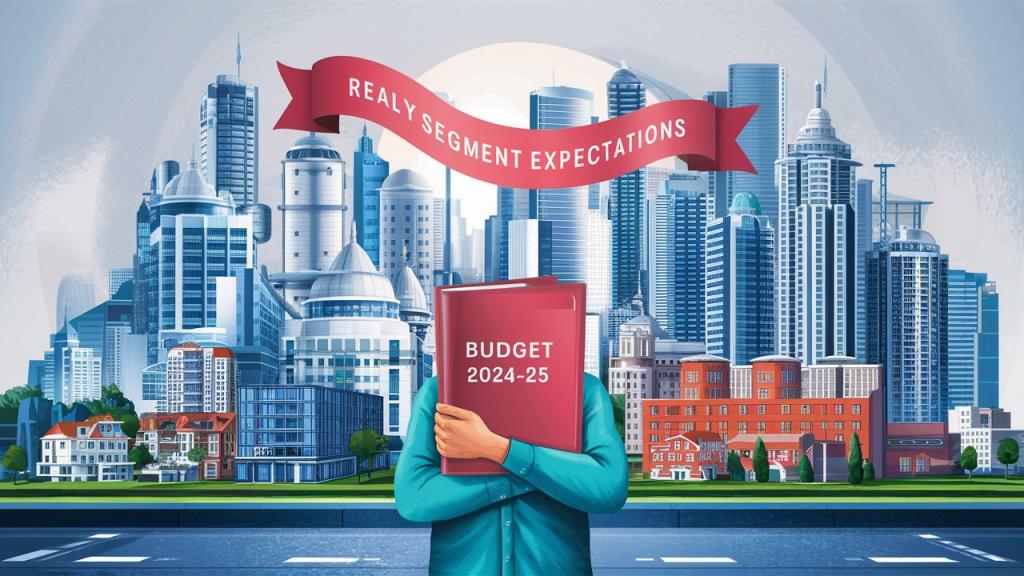
Realty Segment Expectations from Budget 2024-25
The real estate sector is one of the cornerstones of the Indian economy, contributing significantly to the country’s GDP and employment. As Budget 2024-25 approaches, the realty segment has high hopes for measures that can invigorate growth, attract investment, and provide relief to both developers and homebuyers. This article explores the key expectations of the real estate industry from the upcoming budget.
1. Tax Reforms and Incentives
1.1. Reduction in GST Rates
The Goods and Services Tax (GST) has been a contentious issue for the real estate sector. Currently, GST rates for under-construction properties stand at 5% without input tax credit (ITC) for non-affordable housing and 1% without ITC for affordable housing. The industry hopes for a reduction in these rates or the reintroduction of ITC to reduce the financial burden on homebuyers and developers.
1.2. Increase in Tax Deductions
The real estate sector is also seeking an increase in tax deductions available for homebuyers under Section 80C and Section 24(b) of the Income Tax Act. Raising the limit of principal repayment under Section 80C from Rs. 1.5 lakh to Rs. 3 lakh and the interest deduction under Section 24(b) from Rs. 2 lakh to Rs. 3 lakh would incentivize home purchases and stimulate demand.
1.3. Tax Holidays for Affordable Housing Projects
To promote affordable housing, the industry expects an extension of tax holidays under Section 80IBA for developers of affordable housing projects. This would encourage more investments in the affordable housing segment, aligning with the government’s vision of "Housing for All."
2. Enhanced Infrastructure Spending
2.1. Urban Infrastructure Development
Investment in urban infrastructure is crucial for the growth of the real estate sector. The industry expects significant budget allocations for the development of smart cities, urban transport, and basic amenities like water, sanitation, and electricity. Improved infrastructure attracts investment and boosts real estate demand.
2.2. Suburban Connectivity
The development of suburban areas through enhanced connectivity with major cities can decongest urban centers and provide affordable housing options. The real estate sector hopes for increased funding for projects like metro expansions, expressways, and commuter rail systems that connect suburbs to city centers.
3. Easing Liquidity and Financing
3.1. Access to Affordable Financing
Liquidity remains a critical issue for developers, especially post-pandemic. The industry anticipates measures that can ease access to affordable financing for real estate projects. Initiatives like reducing interest rates on loans for developers and homebuyers, and providing special financial packages for stalled projects, are expected.
3.2. Single Window Clearance System
A streamlined single window clearance system for real estate projects can significantly reduce approval times and costs. The industry hopes for budgetary provisions that facilitate the implementation of such a system, enhancing ease of doing business and boosting project completion rates.
3.3. Alternative Investment Funds (AIFs)
The creation and promotion of Alternative Investment Funds (AIFs) focused on real estate can provide much-needed capital to the sector. The industry expects policies that encourage investment in AIFs and facilitate their growth, providing a steady flow of funds for real estate development.
4. Policy Reforms and Regulatory Measures
4.1. Implementation of Model Tenancy Act
The Model Tenancy Act aims to balance the interests of landlords and tenants, promoting rental housing. The real estate sector looks forward to its swift implementation across states, which can unlock the potential of the rental market and provide a steady income stream for property owners.
4.2. Incentives for Green Buildings
Sustainable development is becoming increasingly important. The industry expects incentives for green building projects, such as tax rebates, subsidies for eco-friendly materials, and faster clearances for green-certified buildings. These measures can promote sustainable practices and attract environmentally conscious investors.
4.3. Strengthening RERA
The Real Estate (Regulation and Development) Act, 2016 (RERA) has brought transparency and accountability to the sector. However, there is a need for further strengthening its implementation. The industry hopes for budgetary allocations to enhance RERA’s functioning and ensure its effective enforcement across states.
5. Revival of Stalled Projects
5.1. Special Funds for Stalled Projects
Stalled real estate projects have been a significant concern, leading to financial losses and loss of buyer confidence. The industry expects the government to allocate special funds to revive these projects. Such initiatives can ensure project completion and restore buyer trust.
5.2. Swift Resolution of Bankruptcy Cases
Many real estate developers have faced financial distress, leading to bankruptcy proceedings. The industry hopes for faster resolution of these cases to ensure that buyers do not suffer due to prolonged legal battles. Policies that expedite insolvency processes and protect the interests of homebuyers are crucial.
6. Boosting Affordable Housing
6.1. Subsidies and Incentives
Affordable housing remains a priority for the government. The industry anticipates continued subsidies and incentives under schemes like Pradhan Mantri Awas Yojana (PMAY). Increasing the allocation for these schemes and simplifying the application process can further boost affordable housing development.
6.2. Interest Subsidy Schemes
Interest subsidy schemes for homebuyers, especially in the affordable housing segment, can make home loans more attractive. The industry hopes for the continuation and expansion of such schemes to cover a broader range of homebuyers.
7. Encouraging Foreign Investment
7.1. Relaxation of FDI Norms
Foreign Direct Investment (FDI) can bring in substantial capital and expertise to the real estate sector. The industry expects a relaxation of FDI norms, making it easier for foreign investors to invest in real estate projects, particularly in the commercial and residential segments.
7.2. Tax Benefits for NRIs
Non-Resident Indians (NRIs) are significant investors in the Indian real estate market. Providing tax benefits and easing repatriation norms can attract more NRI investments, boosting the sector's growth.
8. Technological Advancements
8.1. Promotion of PropTech
The integration of technology in real estate, known as PropTech, can revolutionize the sector. The industry looks forward to incentives for PropTech startups and funding for technological advancements that can streamline operations, enhance transparency, and improve customer experience.
8.2. Digital Land Records
Digitizing land records can significantly reduce disputes and enhance transparency in property transactions. The industry hopes for budgetary allocations towards the digitization of land records, ensuring clear titles and reducing fraud.
The real estate sector is poised for growth, but it requires the right policies and incentives from the government to realize its full potential. Budget 2024-25 presents an opportunity for the government to address the challenges faced by the industry and provide the necessary impetus for its growth. From tax reforms and infrastructure spending to easing liquidity and regulatory measures, the expectations are high. By addressing these expectations, the government can not only boost the real estate sector but also contribute significantly to economic growth and development.
Investors, developers, and homebuyers alike are looking forward to a budget that supports sustainable growth, encourages investment, and provides relief amidst the current economic challenges. The realty segment's expectations from Budget 2024-25 reflect a need for a balanced approach that promotes affordability, transparency, and innovation in the sector.






